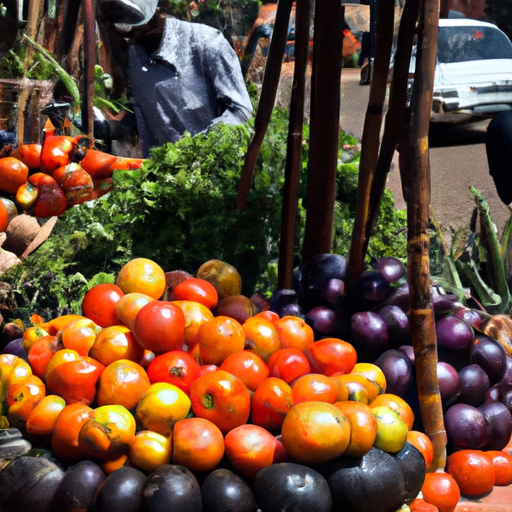How Do Kenyans Engage In Sustainable Agriculture?
If you’ve ever wondered how Kenyans participate in sustainable agriculture, this article is here to shed some light on the subject. Kenya, known for its diverse and fertile lands, has a strong agricultural sector that sustains both its economy and its people. From implementing organic farming methods to promoting water conservation techniques, Kenyans have shown a steadfast commitment to ensuring sustainability in their agricultural practices. With a focus on natural resource management and community involvement, Kenyans have embraced a holistic approach to agriculture that not only supports their livelihoods but also protects the environment for future generations.

This image is property of pixabay.com.
Traditional Farming Techniques
Crop Rotation
Crop rotation is a widely practiced traditional farming technique in Kenya. It involves the systematic rotation of different crops on the same piece of land over a period of time. This helps prevent the depletion of soil nutrients and reduces the risk of pest and disease infestation. By rotating crops, you are effectively breaking the pests’ life cycles, as they often specialize in certain plants. Crop rotation also helps maintain soil structure and fertility, leading to better yields and healthier plants.
Agroforestry
Agroforestry is another traditional farming technique embraced by Kenyan farmers. It involves the intentional integration of trees and shrubs with crops and livestock in order to create a sustainable and productive farming system. The trees provide shade, prevent soil erosion, and act as windbreaks, while also producing timber, fruits, or nuts. In agroforestry systems, the crops benefit from the nutrients released by the trees, while the trees benefit from the additional moisture and protection provided by the crops.
Terracing
Terracing is a method of land management that involves the creation of level steps or terraces on sloping terrain. This technique helps prevent soil erosion by slowing down the movement of water, as well as retaining moisture on the terraced areas. By practicing terracing, farmers can effectively cultivate hilly or mountainous areas, making use of land that would otherwise be difficult to farm. Terracing also prevents nutrient loss and enables effective water management, resulting in increased agricultural productivity.
Use of Organic Fertilizers
Compost
Compost is widely used as an organic fertilizer in sustainable farming practices in Kenya. It is made by decomposing organic materials such as food waste, crop residues, and animal manure. Compost is rich in essential plant nutrients and beneficial microorganisms that improve soil fertility and health. By using compost, farmers can reduce the reliance on synthetic fertilizers, enhance soil structure, and improve water retention capacity. It also helps in the recycling of organic waste, promoting a circular economy.
Manure
Manure is another organic fertilizer extensively used in sustainable agriculture in Kenya. It is derived from animal waste, such as cow dung, poultry droppings, and goat manure. Manure provides a balanced mix of essential nutrients, including nitrogen, phosphorus, and potassium, which are vital for plant growth. Using manure as a fertilizer helps improve soil structure, increase microbial activity, and enhance nutrient availability to plants. It also reduces waste disposal problems and contributes to the overall sustainability of farming systems.
Green Manure
Green manure is a practice where certain plants, such as legumes or cover crops, are grown and then plowed back into the soil to enrich its fertility. These green manure crops add organic matter to the soil, which improves soil structure, enhances nutrient retention, and increases water-holding capacity. They also fix atmospheric nitrogen, reducing the need for synthetic nitrogen fertilizers. The incorporation of green manure crops into farming systems promotes sustainability by reducing reliance on external inputs and enhancing soil health.

This image is property of pixabay.com.
Water Conservation Strategies
Rainwater Harvesting
Rainwater harvesting is a sustainable water conservation strategy widely employed by farmers in Kenya. It involves collecting and storing rainwater for later use in agricultural activities. Various techniques, such as rooftop catchment systems, surface runoff harvesters, and farm ponds, are used to channel and store rainwater. By harnessing rainwater, farmers can alleviate the dependence on unreliable rainfall patterns and irrigation systems, ensuring a steady supply of water for crops and livestock throughout the year.
Drip Irrigation
Drip irrigation is an efficient water conservation technique increasingly adopted by Kenyan farmers. It involves the slow and precise application of water directly to the root zone of plants through a network of pipes and emitters. Compared to traditional flood or sprinkler irrigation methods, drip irrigation minimizes water wastage through evaporation and runoff. It also allows for precise control of water and nutrient delivery, resulting in improved crop growth, higher yields, and water savings.
Mulching
Mulching is a simple yet effective water conservation practice widely practiced in Kenya. It involves covering the soil surface around plants with organic or inorganic materials to reduce evaporation and improve water retention. Mulch acts as a protective barrier against temperature fluctuations, weed growth, and erosion. It also helps maintain soil moisture levels by reducing evaporation and controlling weed competition, thereby promoting sustainable water use in agriculture.
Integrated Pest Management
Biological Control
Biological control is an integral part of sustainable pest management in Kenyan agriculture. It involves the use of natural enemies, such as beneficial insects, predators, or parasites, to control pests and minimize the use of chemical pesticides. By harnessing the power of nature, farmers can maintain a balance between pests and their natural enemies, reducing the need for synthetic pesticides. Biological control strategies include the release of beneficial insects, conservation of natural habitats, and the use of trap crops to attract and control pests.
Crop Rotation
Crop rotation, mentioned earlier as a traditional farming technique, is also an effective method for managing pests in a sustainable manner. By rotating crops, farmers disrupt the life cycles of pests, reducing their population and minimizing the risk of infestations. Different crops have varying susceptibility to pests and diseases, so rotating crops helps break the cycle of pest reproduction. Furthermore, certain crops act as natural repellents or trap crops for specific pests, further reducing the need for chemical interventions.
Pheromone Traps
Pheromone traps are widely used in integrated pest management approaches in Kenya. Pheromones are chemical substances released by insects to communicate with each other for mating purposes. By strategically placing pheromone traps, farmers can attract and trap specific pests, disrupting their reproductive cycle. This targeted approach helps reduce the population of pests without harming beneficial insects or pollinators. Pheromone traps are especially effective for monitoring and controlling pest infestations in crops such as maize, tomatoes, and cotton.

This image is property of pixabay.com.
Conservation of Biodiversity
Polyculture
Polyculture is a farming practice that involves growing multiple crops or raising diverse livestock species together in the same field or farm. By diversifying the plant and animal species, farmers create a balanced ecosystem that promotes biodiversity and reduces the risk of pest and disease outbreaks. Different plants attract different pollinators and beneficial insects, contributing to a healthier and more resilient farming system. Polyculture also improves soil fertility, water use efficiency, and overall farm productivity.
Use of Native Plant Species
Kenyan farmers recognize the importance of using native plant species in their farming practices to support biodiversity conservation. Native plants are well-suited to the local environment and provide habitat, food, and shelter for various animal species, including pollinators and beneficial insects. By incorporating native plants into agricultural landscapes, farmers help maintain a diverse ecosystem and promote the natural balance of predator-prey relationships. This reduces the reliance on synthetic inputs and fosters a sustainable farming environment.
Habitat Restoration
Habitat restoration is an essential component of sustainable agriculture in Kenya. It involves the conservation and restoration of natural habitats within and around farmland to support biodiversity and ecosystem services. Farmers engage in activities such as reforestation, planting hedgerows, and creating wetlands to provide habitats for diverse plant and animal species. These restored habitats support pollinators, insect predators, and birds, which contribute to pest control and overall ecological balance in agricultural ecosystems.
Adoption of Modern Technologies
Precision Farming
Precision farming is a modern technology widely adopted by Kenyan farmers to optimize resource use and increase agricultural efficiency. It involves the use of advanced technologies such as GPS, remote sensing, and data analytics to monitor and manage agricultural practices at a spatial and temporal scale. By precisely tailoring inputs such as water, fertilizers, and pesticides to the specific needs of crops, farmers can minimize waste, reduce environmental impacts, and achieve higher yields.
Use of Drones
The use of drones is gaining popularity in Kenyan agriculture, enabling farmers to monitor and manage their fields more effectively. Drones equipped with sensors and cameras can provide valuable data on crop health, plant density, and pest infestations. This information helps farmers make informed decisions related to irrigation, fertilization, and pest management. Drones also enable efficient and timely application of inputs, reducing labor and costs while minimizing environmental impacts.
Smart Irrigation Systems
Smart irrigation systems are revolutionizing water management in Kenyan agriculture. These systems utilize sensor technology, weather data, and automated controllers to optimize water use in irrigation. By continuously monitoring soil moisture levels and weather conditions, smart irrigation systems can deliver the right amount of water at the right time, ensuring that crops receive optimal irrigation while minimizing water waste. The use of smart irrigation systems leads to improved water efficiency, reduced energy consumption, and better crop performance.
Promotion of Sustainable Livestock Farming
Grazing Management
Sustainable livestock farming in Kenya involves employing proper grazing management techniques. Grazing management ensures that livestock have access to adequate forage while preventing overgrazing and soil degradation. Techniques such as rotational grazing, which involves dividing the pasture into smaller paddocks and rotating livestock between them, allow for vegetation recovery and promote healthy grass growth. Well-managed grazing also enhances soil fertility and reduces the risk of erosion.
Stocking Rates
Stocking rates refer to the number of animals allowed per unit of land in grazing systems. Proper stocking rates ensure that the available forage can support the livestock population without degrading the pasture or causing harm to the environment. By managing stocking rates, farmers can prevent overgrazing, maintain a healthy balance between livestock and pasture, and promote sustainable livestock farming practices.
Manure Management
Proper management of livestock manure is crucial for sustainable livestock farming in Kenya. Livestock waste can be a valuable source of nutrients for crops but can also pose environmental risks if not properly managed. Farmers employ techniques such as composting or manure storage systems to safely store and utilize livestock waste. By effectively managing manure, farmers can harness its benefits as organic fertilizer while preventing water pollution and minimizing greenhouse gas emissions.
Promoting Agroecology
Farmer Field Schools
Farmer Field Schools are educational programs that provide practical training and knowledge-sharing opportunities to farmers. These schools focus on promoting sustainable farming practices, agroecology, and biodiversity conservation. Through interactive and participatory learning, farmers gain hands-on experience in implementing sustainable farming techniques and exchange knowledge with their peers. Farmer Field Schools serve as platforms for capacity building and empower farmers to adopt environmentally friendly farming practices.
Knowledge Sharing Platforms
Knowledge sharing platforms play a crucial role in promoting sustainable agriculture in Kenya. These platforms bring together farmers, researchers, and agricultural experts to collaborate, exchange ideas, and disseminate information on sustainable farming practices. Through online forums, workshops, and conferences, farmers can access the latest research, innovations, and best practices. Knowledge sharing platforms foster a culture of learning and continuous improvement in sustainable agriculture.
Capacity Building Programs
Capacity building programs are essential for enhancing the knowledge and skills of farmers in sustainable agricultural practices. These programs provide training, workshops, and technical assistance to farmers on various aspects of sustainable farming, including organic practices, water conservation, pest management, and soil health. By equipping farmers with the necessary knowledge and skills, capacity building programs empower them to adopt sustainable farming techniques and overcome the challenges associated with transitioning to more sustainable practices.
Promotion of Organic Farming
Certification Programs
Certification programs play a vital role in promoting organic farming in Kenya. These programs involve independent organizations that verify and certify that farms meet specific organic standards. Farmers who meet the criteria are awarded organic certification, allowing them to market their produce as organic. Certification programs provide consumers with confidence in the authenticity and quality of organic products, while also assuring farmers of fair practices and pricing.
Market Access Support
To encourage organic farming, market access support is essential. Kenyan farmers engaged in organic farming benefit from initiatives that help them access domestic and international markets for organic produce. Through market linkages, farmers can command premium prices for their organic products, ensuring economic sustainability. Non-governmental organizations, government agencies, and agricultural cooperatives play an active role in facilitating market access support for organic farmers in Kenya.
Farmer Cooperatives
Farmer cooperatives are instrumental in promoting organic farming by providing collective strength and support to farmers. These cooperatives bring farmers together, enabling them to pool their resources, knowledge, and experiences. By working together, farmers can access financing, share farming equipment, collectively market their produce, and negotiate fair prices. Farmer cooperatives also promote sustainable practices by facilitating the adoption of organic farming techniques, training farmers, and advocating for their interests at various levels.
Government Policies and Initiatives
Subsidies for Sustainable Practices
The Kenyan government plays an active role in promoting sustainable agriculture through various policies and initiatives. One such initiative is the provision of subsidies for sustainable farming practices. These subsidies aim to incentivize farmers to adopt environmentally friendly practices, such as organic farming, water conservation, and soil management. By reducing the financial burden associated with adopting sustainable practices, subsidies encourage more farmers to embrace sustainable agriculture.
Research and Development Funding
Research and development (R&D) funding is crucial for advancing sustainable agriculture in Kenya. The government allocates resources to support research initiatives that focus on developing and disseminating sustainable farming technologies, practices, and innovations. R&D funding enables scientists, researchers, and agricultural experts to address pressing challenges, develop climate-resilient crops, design sustainable farming systems, and improve pest and disease management strategies.
Awareness Campaigns
The government conducts awareness campaigns to educate farmers and the general public about the importance of sustainable agriculture. These campaigns aim to increase awareness of sustainable farming practices and their benefits for the environment, human health, and rural livelihoods. Through mass media, workshops, training programs, and community outreach, the government raises awareness about sustainable agriculture and encourages farmers to adopt practices that promote long-term environmental sustainability.
In conclusion, Kenyan farmers engage in sustainable agriculture through a combination of traditional farming techniques, the use of organic fertilizers, water conservation strategies, integrated pest management strategies, conservation of biodiversity, adoption of modern technologies, promotion of sustainable livestock farming, agroecology practices, promotion of organic farming, as well as government policies and initiatives. These diverse approaches contribute to the sustainability of agriculture in Kenya, ensuring food security, environmental conservation, and rural development. Through continued efforts to embrace sustainable practices, Kenyan farmers are leading the way in building a more resilient and sustainable agricultural sector.







